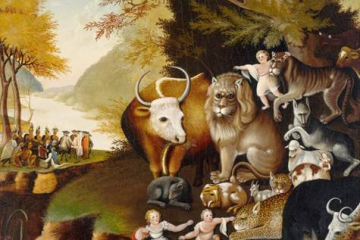But wait there’s more – Matthew 13:31-32, Ezekiel 17:22-24
At the end of Matthew chapter 13, in the space of just nine verses, Jesus tells five parables – short, sharp, evocative parables – that reveal, to stick with seeds theme, kernels of truth about the kingdom of God – about what the reign of God looks like in our lives and world.
But because we have been talking about seeds over the last few weeks, I thought we would just focus on one of these parables – the parable of the mustard seed – this morning.
And really, one is enough because – as it describes – the parable starts small (our gospel reading was just two verses) but grows, first to a great understanding of the kingdom of God, then to a greater understanding of the kingdom of God, and finally to the greatest understanding of the kingdom of God – a God and a kingdom with arms wide open to welcome all people.
Firstly, what the parable says to us is – borrowing from Kev Carmody and Paul Kelly – “from little things big things grow!” It reminds us of the very basic, but miraculous nature of nature – that plants start as small, often invisible, seeds, and become large, flourishing plants, or tall, towering trees.
Now, spoiler alert! Jesus uses storyteller’s license to say that the mustard seed is the smallest of all the seeds. It’s not. The smallest seeds in the world come from tropical orchids. They are 85 micrometres long (or 1/300th of an inch) and weigh 0.81 micrograms. They are dispersed like minute dust particles and come to rest in the tops of rainforest trees where they germinate.
And for your interest – because I find this amazing – the largest tree to grow from the smallest seeds are the giant sequoias (Sequoiadendron giganteum) found on the western slope of the Sierra Nevada range in California. Their seeds are the size of a pinhead, but the trees grow to a height of 87 meters or more, and a circumference of 34 meters or more. In other words, they are as tall as a 26-story building and as wide as a street. They also have a documented lifespan of 3266 years placing them among the tallest, widest, and longest-living organisms on earth.
None of this impacts the veracity of Jesus’ parable. His point is that the kingdom of God, growing in our lives and in our world, may not seem very large, may not appear to have a large impact, but that smallness can be deceiving. One day, what looked small will be seen as something truly significant.
I’ve shared with you before the story of a very small, but powerful act that impacted Archbishop Desmond Tutu’s life. He shared it in an interview with the BBC and it was told again in the presentation speech when he received the 1984 Nobel Peace Prize.
When he was nine, Tutu and his mother were walking down the street in Johannesburg, and coming the other way was Trevor Huddlestone, a white Anglican priest who worked in the black slum of Sophiatown. During apartheid, when a black person and a white person met on a footpath, the black person was expected to step into the gutter to allow the white person to pass. But this day, before Tutu and his mother could step aside, Huddleston did, and, as they passed him, he tipped his hat to Tutu’s mother.
When Tutu asked his mother why, she told him Trevor Huddleston had stepped off the footpath because he was a man of God. That very ordinary action in that one moment, Tutu says, was the defining moment of his life. He found his calling, “When she told me that he was an Anglican priest I decided there and then that I wanted to be an Anglican priest too. And what is more, I wanted to be a man of God.”
It is the small, but big decisions – in our actions, in our words, in our lives – to be men of God, women of God, people of God that grow the kingdom of God in our world.
But there is more to this parable than big growing from little. We gain a greater understanding of the kingdom of God when we ask, ‘What tree is that?’
When I was growing up – before there was internet – we identified plants and trees through books! In our house it was Stirling Macoboy’s What plant is that? or What tree is that? And this parable raises a ‘What tree is that?’ moment because although Jesus refers to a tree and evokes Old Testament images of trees he does not really seem to be talking about trees!
The trees in the Old Testament – apart from Ezekiel 17 that we read this morning – are problematic images. Yes, they are tall – towering high above all the trees, Ezekiel says, as tall as 26-story buildings. Yes, they are beautiful. Yes, they provide food and shelter. But they are also proud and oppressive. They represent the empires of the Babylonians and the Assyrians and the Egyptians. What the text is saying – what Jesus is saying – is that even magnificence – even generous munificence – can be used to dominate, to smother and to oppress.
So, Jesus is not speaking of a mighty tree in Matthew. He is speaking about a bush, an ordinary bush, a bush that many considered to be a weed. Does that resonate with what we heard last week? A weed that once it flowered and shed its seed, was almost impossible to get rid of.
This is the scandal of the kingdom of God. It is a weed! It is planted by one, according to Isaiah 53, who:
“grew up… like a young plant,
and like a root out of dry ground;
he had no form or majesty that we should look at him,
nothing in his appearance that we should desire him.
He was despised and rejected by others…
And this is a scandal of the people of God. We too are weeds. We are, as 1 Corinthians 1 says, the foolish chosen “to shame the wise”. We are the weak chosen “to shame the strong”. Verse 28: “God chose what is low and despised in the world, things that are not, to abolish things that are.”
The kingdom of God brings life to those who find it. It brings sustenance. But it does not tower over the kingdoms of its day. It does not impress, and it does not oppress. But once it is growing, it is impossible to get rid of – and it is a place where “the birds of the air come and make nests in its branches.”
There is a story about a young – just 22 – archdeacon in Rome, in the third century, named Lawrence, who was responsible for the Church treasury and distributing money to the poor. In August 258, the Emperor Valerian issued an edict that all bishops, priests, and deacons in the Roman empire were to be put to death. and after the execution of Pope Sixtus, the prefect of Rome demanded Lawrence turn over this treasury to him. Lawrence asked for three days to gather the wealth and, in those three days, worked swifty to distribute as much church property to the poor as possible. On the third day, at the head of a small delegation, he presented himself to the prefect, and when ordered to hand over the treasures of the Church, he presented the city’s poor, and declared: “Here are the treasures of the church. You see, the church is truly rich, far richer than your emperor!” And then Lawrence too was executed.
This is the final and greatest understanding of the kingdom of God found in this parable; that our purpose is not to impress the world with our greatness or to impress the world with our wisdom, as 1 Corinthians 1 says, or to impress the world with our strength, but our purpose is to love – to out-love the world with our love – to create places where the birds of the air, where all people, can rest and nest.
“See how they love one another!” is what was said of the early Christians.
We proclaim nothing except the cross of Christ; that the one who planted us, loved us and out-loved us; that one who planted us gave his life to give life to us, and we continue to live in this life and share this life with others.
We are men and women, we are people of God, because we share the life of God.
We are weeds who share the life of God.
We are birds of the air who have found their rest in sharing the life of God.
The kingdom of God is like a mustard seed, says Jesus. God’s kingdom is a sprig, says Ezekiel, a twig. It is a wilderness, a desert, says Isaiah, that will burst into bloom, for God is bringing through this tiny seed, through this weed, through this twig, joy to the world.
We are about to sing this great hymn – Joy to the world – that we associated with Christmas – and as we do I want to invite you to bring the things on your heart – perhaps your desire to be a person of God or perhaps the people or situations you pray will find shelter and sustenance in the kingdom of God. You are invited to write those on the rings of paper in your pews and to come and give them a place on this bush.
To give you some time to think and pray and write we are going to listen first to those words from Isaiah 35 being sung – before we sing together Joy to the world.
Lo, how a Rose e’er blooming
from tender stem hath sprung!
Of Jesse’s lineage coming,
as men of old have sung.
It came a flower bright,
amid the cold of winter,
when half spent was the night.
(German hymn Es ist ein ros, translated by Theodore Baker)


